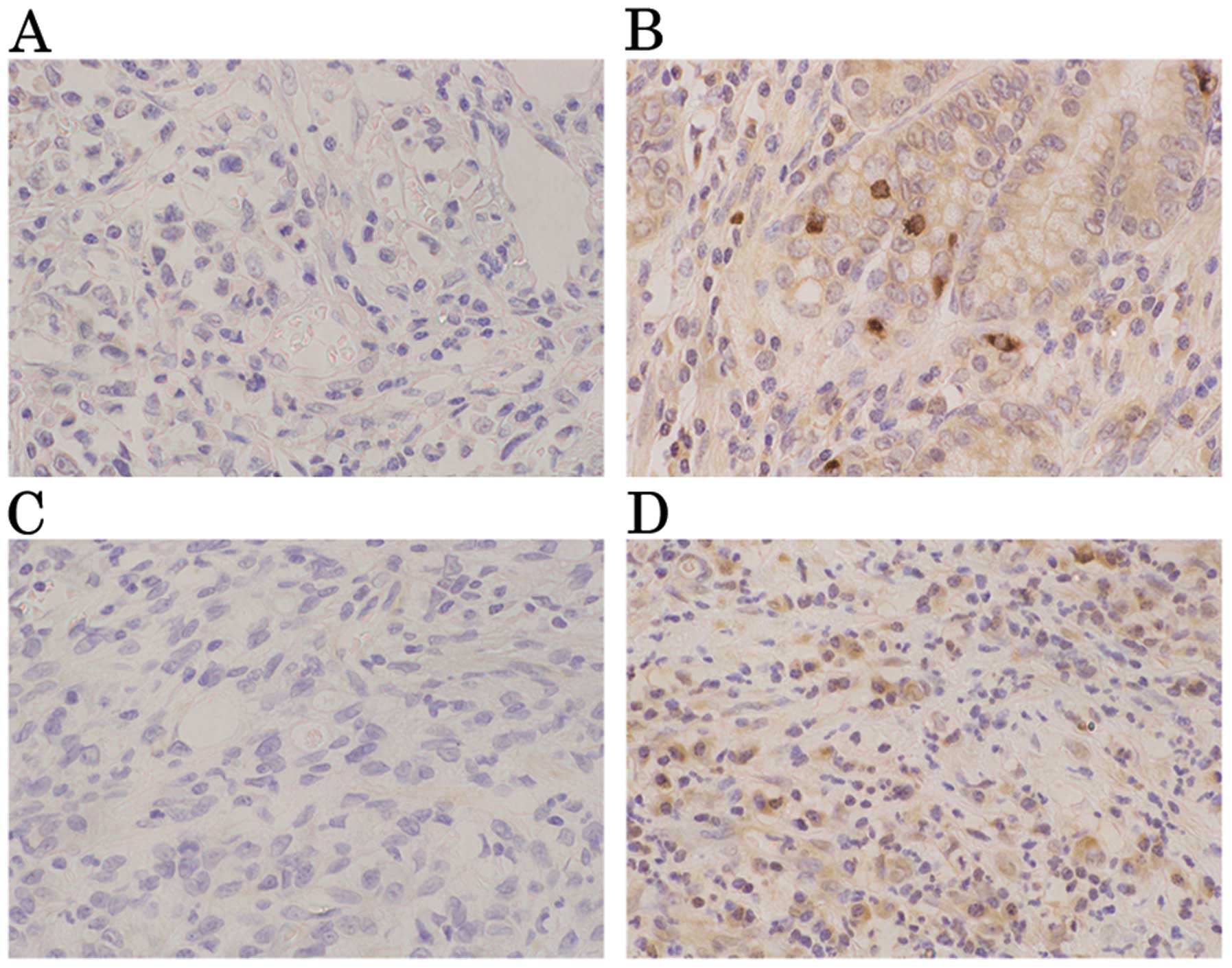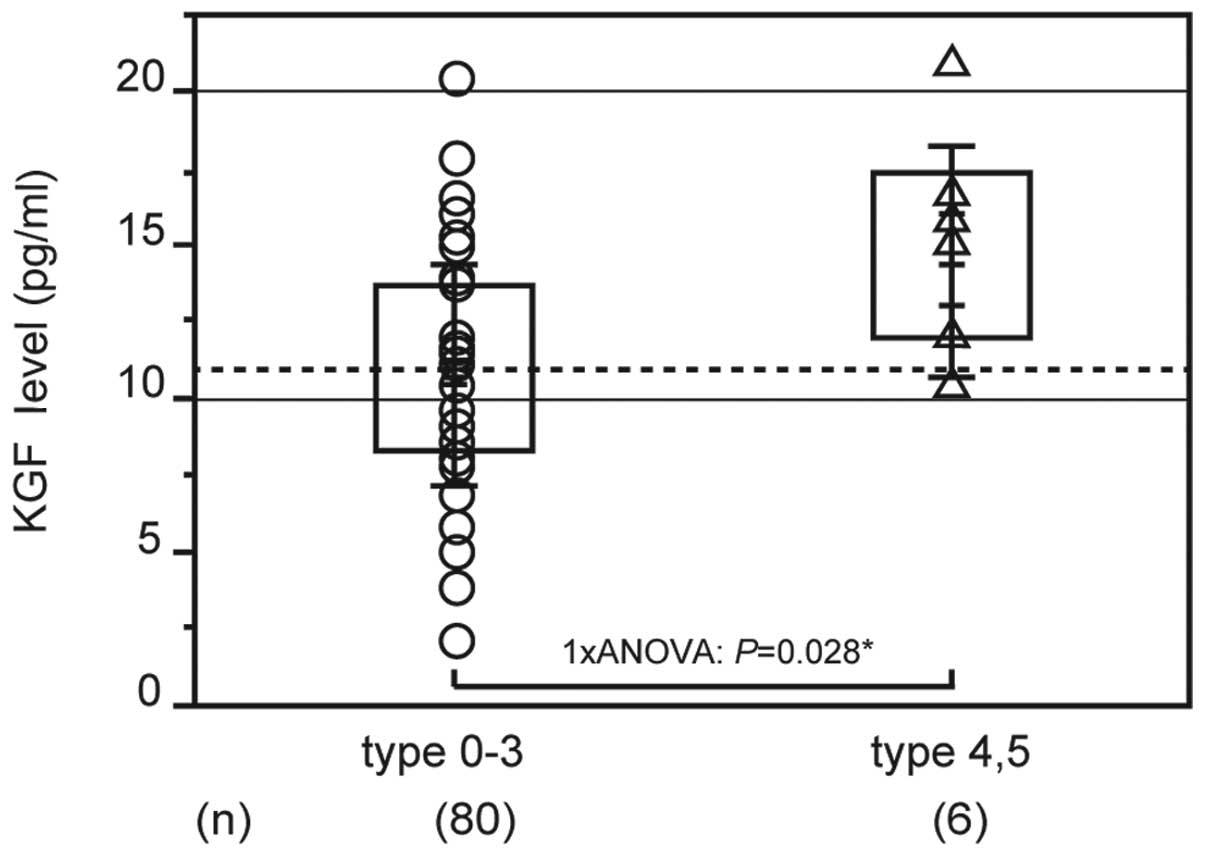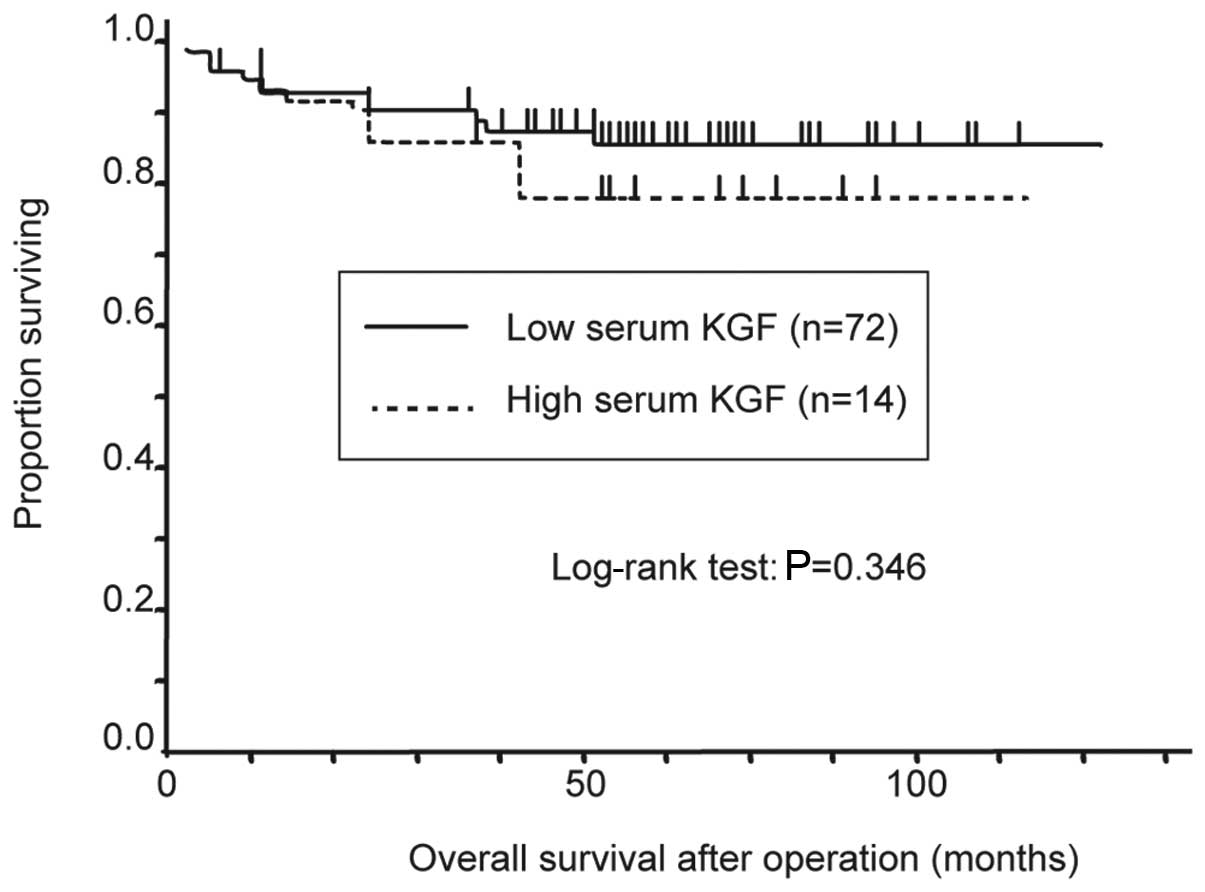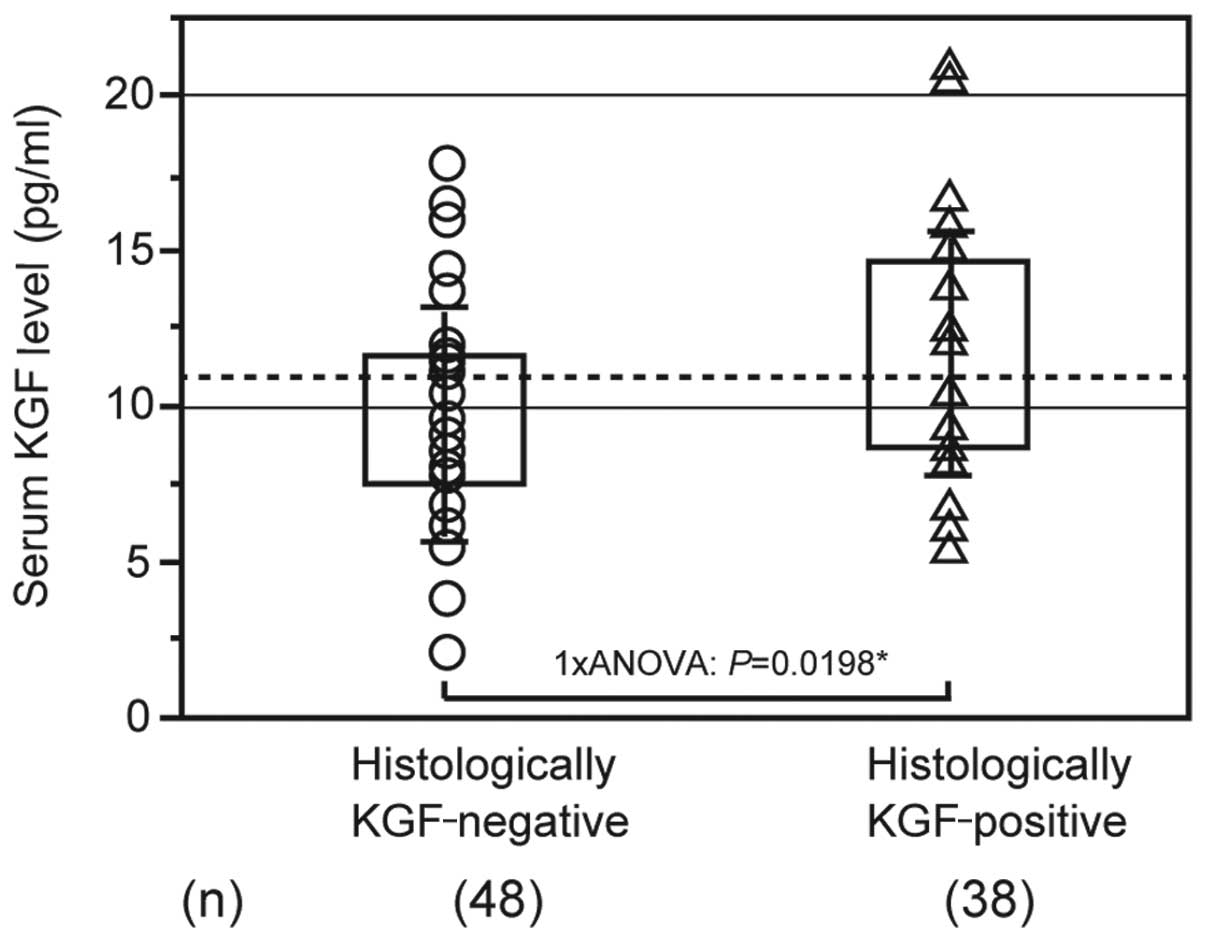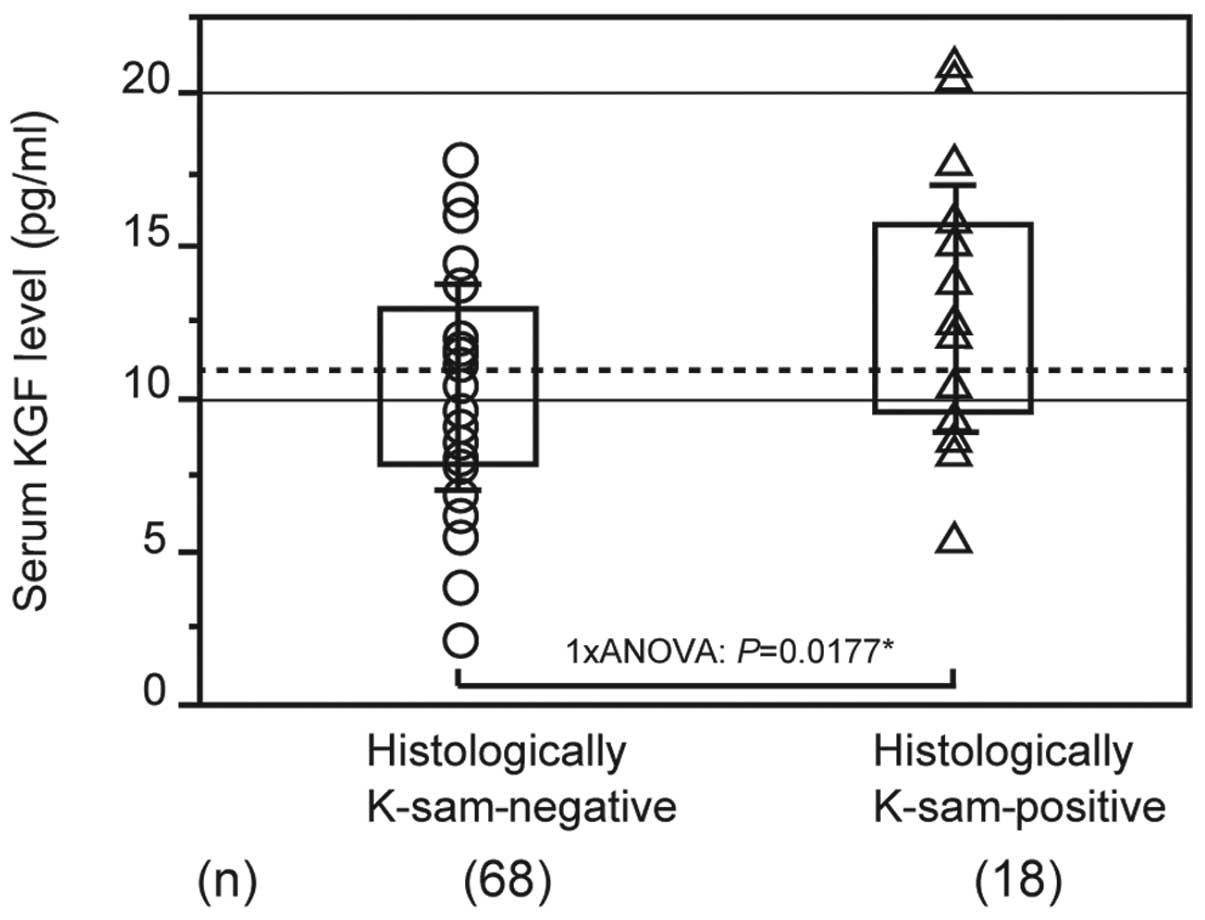|
1
|
Yamada A, Saito N, Kameoka S and Kobayashi
M: Clinical significance of epidermal growth factor (EGF)
expression in gastric cancer. Hepatogastroenterology. 54:1049–1052.
2007.PubMed/NCBI
|
|
2
|
Hirosawa T, Saito N, Kameoka S and
Kobayashi M: Clinical significance of epidermal growth factor (EGF)
expression for assessing the spreading of human colon cancer.
Nippon Daicho Komonbyo Gakkai Zasshi. 55:402–412. 2002. View Article : Google Scholar
|
|
3
|
Soyama K, Saito N and Kameoka K: Study on
adhesion molecule beta1 integrin in colorectal
cancer-quantification of blood levels and immunohistological
staining. Nippon Daicho Komonbyo Gakkai Zasshi. 52:119–127. 1999.
View Article : Google Scholar
|
|
4
|
Suda A, Saito N, Seshimo A, Kameoka S and
Kobayashi M: Examination of transforming growth factor beta1
expression in the serum and tumor tissue of gastric cancer. Int
Surg. 94:182–188. 2009.PubMed/NCBI
|
|
5
|
Daiko W, Saito N and Kameoka S: Clinical
significance of TGF-beta1 expression in evaluation of the
malignancy of colorectal cancer. Nippon Daicho Komonbyo Gakkai
Zasshi. 58:377–382. 2005. View Article : Google Scholar
|
|
6
|
Hashimoto T, Saito N, Kameoka S, Shibata N
and Kobayashi M: Clinical significance of hepatocyte growth factor
and its specific receptor c-Met expression in colorectal cancer
progression. Acta Histochem Cytochem. 37:139–146. 2004. View Article : Google Scholar
|
|
7
|
Saito N, Nishimura H and Kameoka S:
Clinical significance of fibronectin expression in colorectal
cancer. Mol Med Rep. 1:77–81. 2008.PubMed/NCBI
|
|
8
|
Yashiro M, Chung YS and Sowa M: Role of
orthotopic fibroblasts in the development of scirrhous gastric
carcinoma. Jpn J Cancer Res. 85:883–886. 1994. View Article : Google Scholar : PubMed/NCBI
|
|
9
|
Finch PW and Rubin JS: Keratinocyte growth
factor expression and activity in cancer: implications for use in
patients with solid tumors. J Natl Cancer Inst. 98:812–824. 2006.
View Article : Google Scholar : PubMed/NCBI
|
|
10
|
Presta M, Dell’Era P, Mitola S, Moroni E,
Ronca R and Rusnati M: Fibroblast growth factor/fibroblast growth
factor receptor system in angiogenesis. Cytokine Growth Factor Rev.
16:159–178. 2005. View Article : Google Scholar : PubMed/NCBI
|
|
11
|
Szabo S and Sandor Z: Basic fibroblast
growth factor and PDGF in GI diseases. Baillières Clin
Gastroenterol. 10:97–112. 1996.PubMed/NCBI
|
|
12
|
Katoh M and Katoh M: FGF signaling network
in the gastrointestinal tract (Review). Int J Oncol. 29:163–168.
2006.PubMed/NCBI
|
|
13
|
Nakazawa K, Yashiro M and Hirakawa K:
Keratinocyte growth factor produced by gastric fibroblasts
specifically stimulates proliferation of cancer cells from
scirrhous gastric carcinoma. Cancer Res. 63:8848–8852. 2003.
|
|
14
|
Kunii K, Davis L, Gorenstein J, Hatch H,
Yashiro M, Di Bacco A, Elbi C and Lutterbach B: FGFR2-amplified
gastric cancer cell lines require FGFR2 and Erbb3 signaling for
growth and survival. Cancer Res. 68:2340–2348. 2008. View Article : Google Scholar : PubMed/NCBI
|
|
15
|
Yashiro M, Chung Y, Kubo T, Hato F and
Sowa M: Differential responses of scirrhous and well-differentiated
gastric cancer cells to orthotopic fibroblasts. J Cancer.
74:1096–1103. 1996. View Article : Google Scholar : PubMed/NCBI
|
|
16
|
Nakatani H, Tahara E, Yoshida T, Sakamoto
H, Suzuki T, Watanabe H, Sekiguchi M, Kaneko Y, Sakurai M, Terada
M, et al: Detection of amplified DNA sequences in gastric cancers
by a DNA renaturation method in gel. Jpn J Cancer Res. 77:849–853.
1986.PubMed/NCBI
|
|
17
|
Nakatani H, Sakamoto H, Yoshida T, Yokota
J, Tahara E, Sugimura T and Terada M: Isolation of an amplified DNA
sequence in stomach cancer. Jpn J Cancer Res. 81:707–710. 1990.
View Article : Google Scholar : PubMed/NCBI
|
|
18
|
Ishii H, Hattori Y, Itoh H, Kishi T,
Yoshida T, Sakamoto H, Oh H, Yoshida S, Sugimura T and Terada M:
Preferential expression of the third immunoglobulin-like domain of
K-sam product provides keratinocyte growth factor-dependent growth
in carcinoma cell lines. Cancer Res. 54:518–522. 1994.PubMed/NCBI
|
|
19
|
Ishii H, Yoshida T, Oh H, Yoshida S and
Terada M: A truncated K-sam product lacking the distal
carboxyl-terminal portion provides a reduced level of
autophosphorylation and greater resistance against induction of
differentiation. Mol Cell Biol. 15:3664–3671. 1995.
|
|
20
|
Itoh H, Hattori Y, Sakamoto H, Ishii H,
Kishi T, Sasaki H, Yoshida T, Koono M, Sugimura T and Terada M:
Preferential alternative splicing in cancer generates a K-sam
messenger RNA with higher transforming activity. Cancer Res.
54:3237–3241. 1994.PubMed/NCBI
|
|
21
|
Japanese Gastric Cancer Association.
Japanese Classification of Gastric Carcinoma - 2nd English Edition.
Gastric Cancer. 1:10–24. 1998. View Article : Google Scholar : PubMed/NCBI
|
|
22
|
Hattori Y, Itoh H, Uchino S, Hosokawa K,
Ochiai A, Ino Y, Ishii H, Sakamoto H, Yamaguchi N, Yanagihara K,
Hirohashi S, Sugimura T and Terada M: Immunohistochemical detection
of K-sam protein in stomach cancer. Clin Cancer Res. 2:1373–1381.
1996.PubMed/NCBI
|
|
23
|
Toyokawa T, Yashiro M and Hirakawa K:
Co-expression of keratinocyte growth factor and K-sam is an
independent prognostic factor in gastric carcinoma. Oncol Rep.
21:875–880. 2009.PubMed/NCBI
|
|
24
|
Nakamura K, Yashiro M, Matsuoka T, Tendo
M, Shimizu T, Miwa A and Hirakawa K: A novel molecular targeting
compound as K-samII/FGF-R2 phosphorylation inhibitor, Ki23057, for
scirrhous gastric cancer. Gastroenterology. 131:1530–1541. 2006.
View Article : Google Scholar : PubMed/NCBI
|















